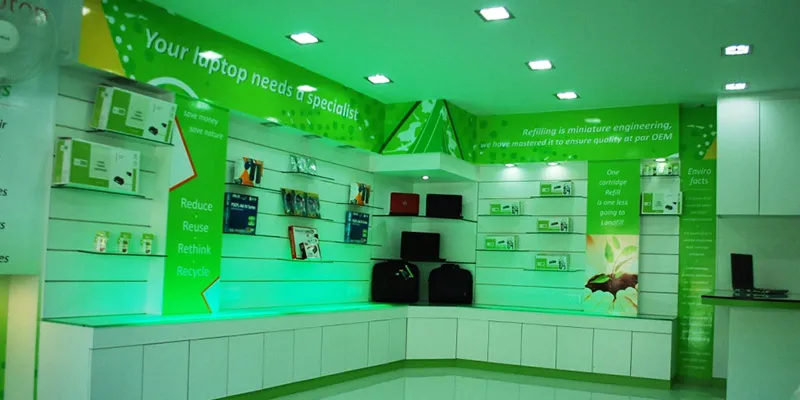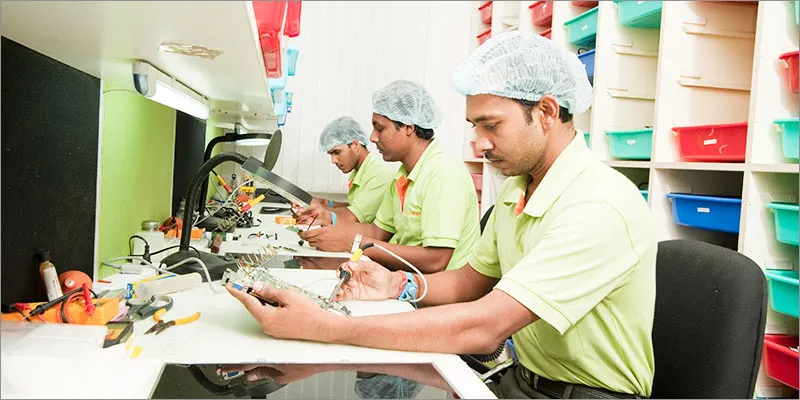From Rs 240 to Rs 20 Cr, the story of Alkesh Agarwal of Re-Feel Cartridge Engineering
For Alkesh Agarwal, starting a business wasn’t an aspiration or a luxury; it was a necessity. Losing both his parents in quick succession, a 16-year-old Alkesh Agarwal had seen times when he didn’t know where his next meal would come from.
“Mom insisted that I must never give up studying – even while I work. My day clocked to 11 pm.”
What happened to him was hardly fair. But the gnawing state of affairs had him working extra hard towards identifying his strong suits and whetting them tirelessly with all he had. So, even as he took on the big bad world at least five years before anyone else, he did so with a classy edge.

“Whatever I thought of doing, even then, it had to be in style,” he says.
There have been incremental improvements in his life: he started out by working hard and earning Rs 240 a week by teaching basic computers in NIIT to raise Rs. 1240 for his fees for college. Then came starting a computer repair service and feeling content with a Rs. 10,000 balance in his bank every month. There were even small assignments in content and branding for companies. Alkesh – Mr. Jugaad, or Mr. Quick-Fix as I call him – it seemed always had a razor-sharp radar for opportunities.
“Anything I can’t control, I will not complain about. But what I can, I will change”
Dabbling with computers over all those years, there came a time when Alkesh decided he’d like to go big, or go home. Entrusting his repair business to his childhood friend and would-be business partner Amit Barmecha, he set out to zero in on a larger problem he could solve.
In his pursuit, he discovered that replacing printer cartridges was a cost that consumers were finding increasingly difficult to incur. Besides, the disposal of these all-plastic cartridges was another glaring issue. The 35 million tons of plastic that were being dumped yearly in landfills – equivalent to the size of 17 football fields – would take thousands of years to biodegrade. The solution, as Alkesh saw it, was to figure out a way to recycle them to reduce costs as well as minimise the carbon print.
Also read: How an MBA grad became a marketplace millionaire by selling umbrellas
“I was blessed to have the four best buddies one could ask for”
Alkesh’s bosom friends Rajesh Agarwal, Samit Lakhotia and Amit were willing to back him up and put their life savings into his idea. With their blessings and a modest two lakh collective capital to get started, Alkesh set out to find some answers. “I travelled for two-and-a-half months to Chandigarh, Ludhiana, Amritsar and Delhi. There wasn’t a single roadside vendor I hadn’t approached in my market research,” he remembers. His research took him as far as China even where he lost his luggage, was duped of his money, and had nothing to eat but some kaju barfi he had luckily packed from home.
He found that the reigning king in the industry of recyclable cartridges – a completely unorganised market at its foetus stage – was Cartridge World. Alkesh decided to offer his alliance to the then market leader.
“One crore for a franchisee,” was the answer he got.
Altogether, the Feisty Four had just Rs two Lakh. Staring down a pit that didn’t seem to have a bottom was the moment when the epiphany struck.

“Let’s start our own brand, and strive for more excellence than competition”
Armed with a plan- and just about that – the four picked out a name that communicated the concept, as well as the cause: Re-Feel. Alkesh learnt Photoshop in 30 days to design the logo, for every penny at that point was precious and could be used only if it was going to multiply.
Come February 9, 2007, the company flagged off, albeit with a modest office to give the brand a physical presence. There hovered a distant dream of a showroom, which evaded them as it entailed an expenditure of at least Rs 25 lakh.
Going out on a limb, Alkesh conjured his usual hacks from a parallel universe of logic, and decided that they will open the brand to franchisee offers, despite not having one of their own – at an inexpensive Rs one lakh.
Also read: Dalit child bride to $112 million CEO: The wonder story of Kalpana Saroj
“You don’t have your own store, nor do you have a wonderful office, nor a foolproof proven concept”
“Everything has a way of falling into place,” Alkesh remembers. “God’s looking out for you. Our first franchisee request came in 10-15 days itself, from a certain N.M. Bothra – our ‘Angel’.” The second franchise was close on its heels, as the same Bothra gave an encore.
Even as the start surpassed their expectations, the bank account kept threatening to flat-line. Down to the last 1.25 lakh gave Alkesh yet another urge to gamble – this time on an exhibition in Mumbai hosted by Franchise India, meant especially for franchisors to meet prospective franchisee seekers.
Bargaining with the organisers to bring the rent of the stall down almost by half, Alkesh packed his bags to bark up another door. “I didn’t want to hire event hostesses that some companies do, to use as bait. I didn’t need tactics like fancy lights and gadgets and flashy banners. I was counting on my company’s mettle to do the talking,” he says.
The puritan’s plan paid off, and three franchises came knocking, where the company’s next Rs. 10 Lakh in revenue came from.
“No looking back!”
Word got around and in two years they usurped a considerable market share. And in a rather poetic turn of events, they equalled and later replaced Cartridge World as market leaders in India.
“When Cartridge World had 30 stores, we had three. When they got to 50, we also had 50. We opened a store every five days in India in 2009.” The media gods obliged too, as they were covered over a hundred times in the subsequent 18 to 20 months. With the attention came some stellar recognition- Emerging company of the Year in 2009; Top 100 Franchisor in 2009, 2010, 2011 consecutively; Best Customer Support, 2010, with Alkesh being featured amongst the top 10 Entrepreneurs from the East by Times of India.
In 2010, Re-Feel had gained enough clout to approach Times of India and enter into a deal worth 15 crores with the media giant. A year later, in a feat that the entrepreneurial and startup world was probably witnessing for the first time, the surging startup bought its equity back from the company.

Soon after, British company TLG Capital valued the Rs. 10-crore Re-feel Cartridge Engineering Pvt Ltd at Rs. 53 Crore, or USD 5 Million to pick up a 36 per cent stake in the company. This was funnelled into a new venture - its wholly-owned subsidiary ClubLaptop. This dealt in printer installation, maintenance and repair services for corporate clients at their sites and bulk print services. Meanwhile, the mother company saw expansion as well, in more locations. Currently, the company stands at over a 100 stores in 83 locations in the country.
The green venture also raked in considerable green-bundles for the unstoppable entrepreneurs, with turnovers that have increased a thousand-fold since they first started out – registering at first a 350, then a 1,000, and now a consistent 200 per cent year-on-year growth over the eight years of the company’s existence.
Related read: ‘When I had no food and only Rs 50 in my pocket’ – a moving story of an entrepreneur
“My admin guy is the senior manager now, with 10 MBAs under him.”
Even with a full basket of milestones, Alkesh says that his greatest achievement till date remains building a committed team, and the company contributing to their personal growth and becoming their stepping stone for success. By 2011, his 16-member team turned into a 100-strong battalion, with 800 others working in their franchisees. “I built a team with mostly freshers. Many have stayed by our side throughout these eight years and have grown at the same pace as the company. My admin guy is now the senior manager with 10 MBAs that report to him and is now gearing up to buy his own home,” he adds.
Alkesh’s incredible tale only goes to prove that an entrepreneur’s three biggest assets are his idea, his ecosystem of people, and last but not the least, his gut.







